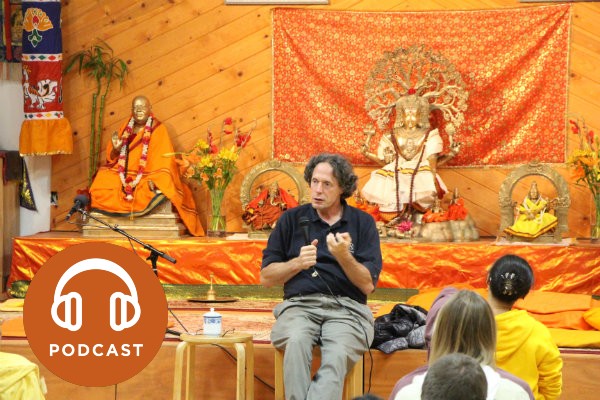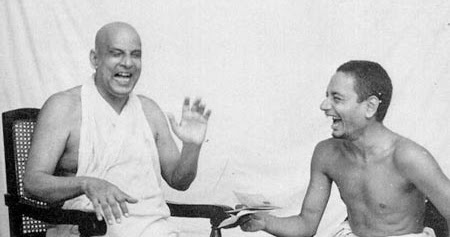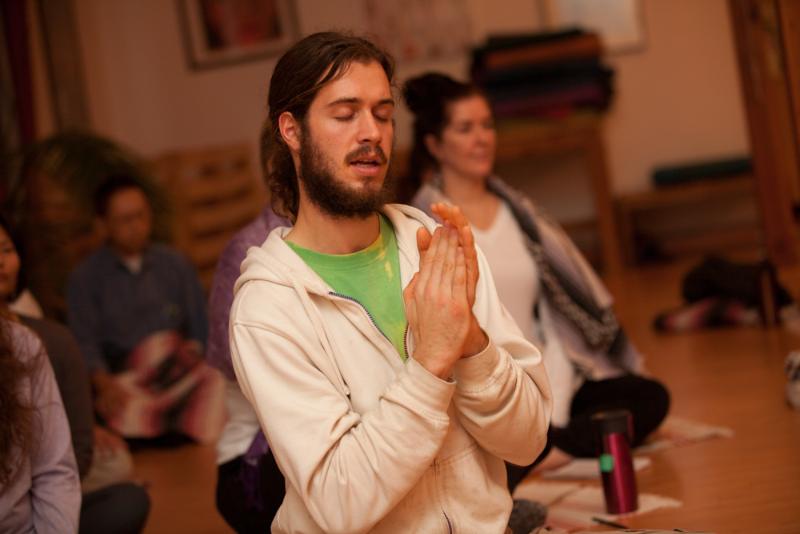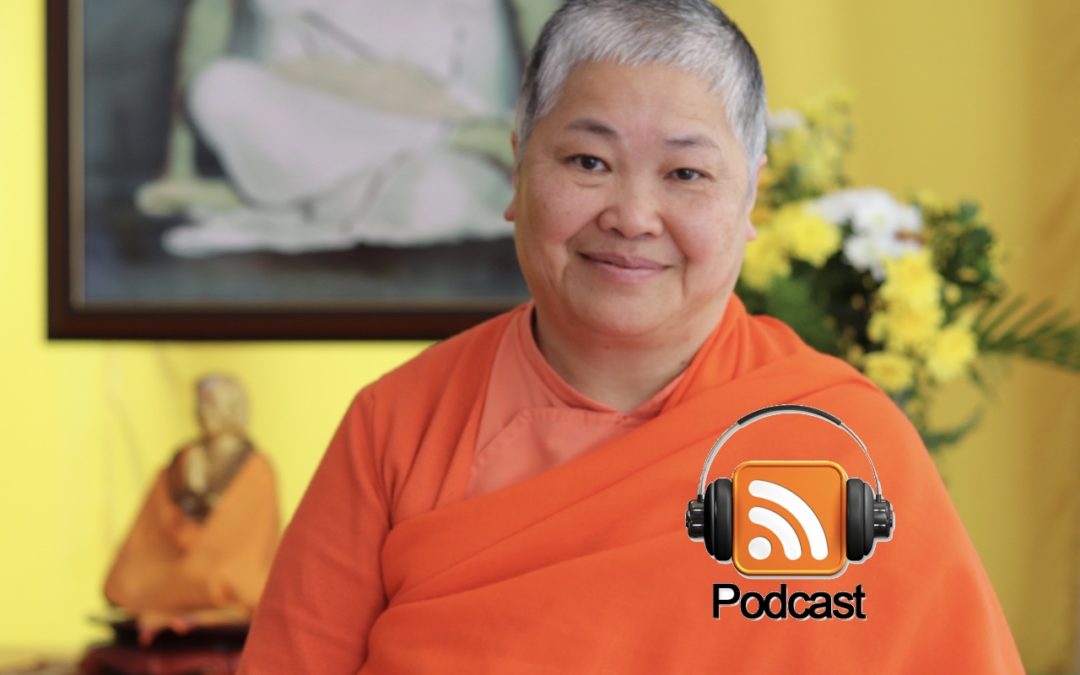
Forgiveness: A talk given by Dr. Fred Luskin
This talk is part of the Sivananda Yoga Health Educator Training (SYHET) course, and was done on a zoom call.
Dr. Fred Luskin
- Consultant
- Director of the Stanford University Forgiveness Projects
- Associate Professor at the Institute of Transpersonal Psychology
Sivananda Yoga Resort and Training Center, Dalat Vietnam, 15 January, 2020
In this talk Dr. Luskin outlines the procedure for forgiveness. This talk was transcribed (with some editing for clarity and brevity) almost verbatim from a video which was recorded on a zoom call.
Introduction
Dr. Luskin is a psychologist and for over 20 years has run the forgiveness program at Stanford University in Northern California, USA. In this talk he explains the process of forgiveness as he is teaching around the world with many different groups. He is helping the SYHET students develop skills for counseling people with health concerns. Please see his biography at the end of this transcript.
Story of Pain
I had a terribly painful experience of being abandoned and betrayed by a friend who was very close to me. One night he brought his new girlfriend for a dinner party at my home, and then suddenly cut off all connection with me.
I held this negative event in my mind for several years, and later realized that I was ruining my life, missing all of the good things in my life because of it. I was arguing with my wife, not appreciating my child, hating my job, and I was miserable, because I was holding on to the story of this event.
In one extreme moment of anger, I noticed that my whole body was strongly affected by the reply of my ex-friend when I tried to reach out to him with a sincere letter and he sent a very short and casual reply on a post card.

Choosing what is right
Then came a painful (but also very helpful) moment with my wife when she strongly pointed out my problem to me. Some time later, while at the supermarket, after being frustrated beyond my capacity with a relatively small problem, and having another intense physical reaction, I had an amazing flash of revelation.
I recognized that I have a choice of paying attention to what is wrong in my life, or paying attention to what is right in my life, and no one else owns that choice except for me. The moment that I had this realization, I told my wife that I was sorry that I had harmed her so much with my bad mood.
Blaming a friend
Then I got in touch with my friend and agreed to meet him, and basically tell him the same thing, that neither of them were responsible for my bad mood, but rather that I was responsible for my bad mood. When we met, we had a very interesting experience, because I had already forgiven him. I realized that he harmed me, and that harm lasted for a year. And then I harmed myself, and that harm lasted for the next two years!
Those two years were not his responsibility, but I had blamed him for my misery. I had blamed him because I could not handle my own life. When I recoginized that fact and I saw him, we did not actually talk about his abandoning me. He was open to me, I had forgiven him, and we had an uncomfortable half hour, but since that half hour we have again been best friends for the next 25 or more years.
Stanford Forgiveness Project
I had let go of blaming him for harming me, because I saw that when he cut off contact with me, I used the situation badly and harmed myself. We then developed these insights into the Stanford forgiveness project, I have written the best-selling book on forgiveness, and we teach people all over the world how to do it. What I will try to do with you is lead you through some of the processes.
Practice Session
First, please think of something in your life of something that you have not forgiven that continues to haunt you in some way.
Then you can turn to someone near you, and talk about what it is that you have not forgiven, and why you have not let it go.
It does not have to be anything very serious, and not something that is so overpowering that you will become emotionally overcome talking about it.
Just choose something that you have not forgiven, describe it, explain what it was, and why you have not forgiven it and can’t let it go.
practice…..

Understanding Homeostasis
What we came to understand over all of those years is that forgiveness is mainly a story-telling problem, a matter of dealing with the stories we create about our life events. What you have is a “default network and setting” in your brain that tries to keep you in what is called homeostasis, where all of the body’s functions can continue in the normal manner. This homeostasis keeps you “level,” meaning in the proper balance.
Depending on the level of tension that you have, and depending on the level of stress that you have experienced, you have a homeostasis which is anywhere from very calm to very anxious. The important point here is that you consider your current state “normal,” even though it may be quite angry, anxious or disturbed.
The more sensitive, angry, anxious, etc. that your homeostatic point is, the more you have mental verbal stories that are designed to keep that homeostasis in tact. So if you are an angry or anxious person, then many of the stories that you tell about your life are designed to keep you from changing. The stories are keeping the body the as it considers normal.
Not knowing your own tendency
Very often angry people have no idea how angry they are! People in a hurry have no idea how much of a hurry they are in. People who are anxious and skiddish have no idea how they appear to others, because it is so normal for them. When you have suffered or when you have been hurt, you go through a natural period of grieving, where you come up with a story to help explain your experience in a way that will generally fit in with who you are.
If you are a generally kind-hearted person and if someone does something nasty, after a while you will get around to some explanation of “well, you know, they did not mean it, or maybe I took it wrong, or it was just a really tough experience for them.” If you are an obnoxious person, then you will come up with a story that makes the other person wrong or which has them with bad motives, and you can stay comfortable being exactly who you are. Some experiences, however, are outside of our normal range, and therefore we have to adjust to them.

The stories we tell ourselves
The thing that happened to my friend was outside of my normal range. It was outside of homeostasis, and the way I had organized my mental life. So I came up with a story that reflected that being outside of my normal range, and it changed me. The story was that life was not fair, life is terrible, and you cannot trust people.
The story changed my day-to-day vibration and perspective, and that is what my wife complained about. She would not have complained if I created a story that fit in with who I was. But I created a story that changed who I think that I am. It changed my physiology, and not just my perspective. It changed my biology, and that is what all of your stories do.
Your stories cement your biology in place, and they are how you change your biology. So if you are practicing meditation and you have a story that you are not good at this practice, then you will get very minimal results. But if your story is that I am good a learning new things, I am open to new experiences, you will get much more benefits from the meditation practices and it will take much less time for the meditation to change you. So if you think that meditation is not anything important, you would have to have very deep meditation experiences before you would be convinced that there are benefits.
Change the Story
With forgiveness, we see that if we create a negative story, we tend to ruin our lives through that story. The story changes our biology, changes our nervous system, and prevents new information from getting in. So if our story changes our outlook to “I cannot trust people” then we see a different world than we saw before the story came. We have now altered the world that we see and the body of the person in that world.
So this is why unforgiveness is so dangerous to us. These stories tend to either alter who we are. If we are generally a positive person, we change to a more negative view, or if we are already a mistrusting person, the stories tend to cement this negative view more into who we are. So ultimately what we understood is that forgiveness is a change in story. We can change the story, even though we cannot change what actually happened.
The change in our homeostasis makes it very hard to change the story, so many of us are stuck in these stories of what happened in our childhood, a lover that left us, or we are critical of ourselves, and these stories limit our capacity to grow. If we can see that what happened is not the fault of our past, or the actions of another person, we are will to change our stories, but until then we feel justified in blaming someone else for ruining part of our life, and it is the blame that is so toxic to your well-being.
Blaming is not the answer
Blame is a quality that by itself leads to helplessness. It also leads to hostility, that is we say, “Because they did something my life is not as good as it could be; it is their fault,” instead of admitting that my current situation is actually due to my own inability to cope, which is the truth. Because we are not able to cope with the situation, we create a story that keeps us stuck.
Practice Session 2
Now we do another two exercises, this time in altering stories, to help you to be able to change. Please go back to the first person and tell a short story about what happened to you. But then take a longer time to explain how that story is now keeping you from creating peace in your life. So our problem is not about the past, but rather about our inability to create a story right now that will bring peace for our current life.
In my case, I can say that my friend harmed me. And that was true for some time. It is not true that my friend harmed me for five years. But then I made bad choices about how to handle the situation that kept me suffering, I was ignorant about how to grow past the situation, and it took me years to figure that out. Whole countries and groups of people are getting together and creating stories about how another group of people is responsible for their lives not being peaceful or happy enough. Forgiveness is changing that story.

Practice changing the story
So now you can go to the first person, and give a short summary of the story you have about how they harmed you. Then begin to tell a different story that will begin something like, “You know, actually the truth is that it is not their fault that I have not forgiven them.” The truth is I just did not know how to forgive, or I did not practice it, or I had no skills as to how to deal with this. That is not a crime!
But the truth is that I did not know how to make peace with this part of my life, and it would be good to learn how to make peace with parts of my life that hurt. With the other person you can now talk about how to create a narative that will help you to move past the problem in your current life, rather than talk about what was done to you in the past. This is just a first pass, but I ask everyone to try. You can explain what it was about yourself that kept you from moving forward, and how you can now learn to do so.
Perhaps you grew up in a house that did not teach you these skills, or this event was too painful, but you want to recognize that now you need to learn, grow and change in order to improve your life. That is the deep shift that occurs in forgiveness, from blame and helplessness to “there is something that I need to develop.” Now please begin the exercise.
practice…..
First step in Forgiveness
OK, thank you for doing the exercise. Usually it takes longer than the time I am asking you to do it, about one hour. However, it can be done more quickly than you think, when you educate people and you have them practice different stories. Because it clicks into people when they realize that, “I have some control of what comes out of my mouth.” If you have been talking for some time about how bad part of your life is, the first step in forgiveness is to stop talking like that. It is simply to shut down that talking.
If people have been wounded, and they have never had the opportunity to talk about it, then talking about it is essential. So if you are a health educator, and someone discloses that they have an issue that they have never told anyone about, never had the opportunity to talk about it, then you need to stop right there and give them the chance to tell you about it. Of course, you must feel comfortable talking with them about the issue, and be theraputically attuned so you are able to deal with the issue. If they want to talk about some serious abuse, probably you should send them to a therapist.
Encourage sharing
If they tell you that they are suicidal, you should send them to a therapist. But if you think their issue is within your scope of practice, which you have to be extraordinaraly careful to maintain, you should give them your attention, because step one is talking about it. You need to encourage them to share it (but only in a safe place), because you want them to talk. Research done on people who have had difficult experiences in life shows that people who heal the least are the ones that do not share. People who hold in their traumas do not heal.
Share with the right people
The second-worst healers are the people who tell everybody about their difficulties. You may meet someone and they say, “I had a terrible childhood, my ex-husband was a bum, I got fired from my job,” and you have never met them before! This type of person does not heal either. It is not quite as toxic as not talking about it, but it is definitely unhealthful. What is healthful is to get it out, short term, to a small number of trusted people.
You could say if there was a significant trauma two months ago, it may be appropriate and helpful to still be talking about it. But if it happened three years ago, the best strategy is to simply stop talking about it. We can apply the technique of “shut up the next time you want to complain about it.” This is the way we can forgive and heal.

Don’t let the story become a habit
This formula is simple and obvious, but most people do not recognize how much they influence their physical and emotional reality to keep telling the same stories over and over and over again. Many people repeat these stories so much for so long that they actually get stuck in the habit, to the extent that they no longer can choose what they are going to say and how they are going to say it! That is the real danger.
If you call you ex-husband a bum for six months, it is very hard in the seventh month to think of them as anything but a bum. If at the age of 15 you started telling the story that you had a terrible mother, then by the age of 30 it will be very hard to change, because by then your whole body has adapted to that story. You have arranged homeostasis around that story, and that is not a healthy place to be.
Allow yourself to feel the emotions in order to heal
If people have not talked at all about the trauma, of course they will not be able to heal at all, because they must process the emotions before they can achieve forgiveness. We call this processing grieving. And people must go through this grieving to help them move past the hurt in their lives. So first they must experience the emotions. If someone hurt you, you may have to experience the anger, if someone left you, you may have to cry, because this is the first step to heal which comes before forgiveness. But if you are around someone who already grieved, got angry, cried, and told the story for some time, then it is time to stop talking about it.
A story can become an addiction almost in the same way a chemical can become an addiction. So it becomes a pattern, you have no control, and no way to stop telling the story or changing it on your own. You do not get any benefit from telling the story again. The first step to change is to admit that you have a problem. You say, “I have a bad habit of talking about this with everyone I meet, and I do not know how to stop. Can you please help me?”
Don’t become the victim
Only you create a “victim.” When you talk about the event in terms of, “there is nothing I can do about this” you become a victim. This is what we do in forgiveness work. We tell them that there is absolutely no value in telling the story again. You are actually laying down more neuro-pathways, making it more difficult to change. This stuff is so simple that it was hard to believe that it came as news when we started using it. And many therapists actually argued with us!
Positive Intention
Here is the way we approached it: we call it “positive intention.” It is asking yourself the question, “In that particular situation what was I looking for, what did I want from it?” For example, you were trying to get a job or perhaps a romantic relationship, which is probably the most common situation that causes people to need to forgive. More people have stories about ending of relationships than any other situation. The vulnerability we have with intimate partners is the most sensitive that we experience. These events are outside of our normal homeostasis.
Let us say that you have had a terrible breakup of an intimate relationship. The approach here is to ask yourself what it was that you were looking for in that relationship. For example, “I wanted this relationship to have someone to enjoy life with, share with, have fun with, grow with, etc.” You want to be honest about that reason. It does not matter what the reason is, but you want to be positive about what you were looking for. “I am not giving up on wanting to get that because this time it did not work out.”
In my example of losing my intimate friend, I have to say, “I loved the situation of having such a wonderful friend, but it did not work out. However, I am not going to give up on having a wonderful friend just because this particular friendship did not last.” And so the story shifts from the past to the future. The story shifts from this was what was wrong, what I did not get, to this is what I am now working to get. So this statement is our positive intention. We say, “Why should I give up trying to get what is important to me?” We can still reach the goal but in a different way.
Practice session 3
So now please go to a different person, and this time, work on telling the positive intention story. You can start with, “OK this difficult thing happened and it was very bad, very painful.” But then you state the positive intention: “This is what I was trying to get, and instead of spending much time obsessing about how I did not get what I wanted, I want to learn how I can get it in a different way.” The unforgiveness story looks backward whereas the forgiveness story looks forward. The unforgiveness story is blaming the other person for not getting what you wanted. The forgiveness story is moving forward to get what you originally wanted. It says, “I will not let this event stand in my way!” It is a complete difference of mental representation. Your body, not just your mind, shifts. You develop an entirely different neuro-architecture.

Meditation to quiet the nervous system
Now I will have you do some very simple meditation practices. The reason for these practices is that if you do not quiet your nervous system, it is hard to cement the result of the other exercises.
- So now please get into a position so that you can sit comfortably for five minutes. From my stress management purposes, I suggest that you not have a perfectly straight posture, but rather focus on having soft shoulders and a relaxed body.
- The main thing is to be able to breathe properly and easily, with a relaxed abdomen.
- Please bring your awareness to your lower abdomen. The key here for stress management is that when you inhale your abdomen expands, and when you exhale, your abdomen contracts.
- Now bring an image to your mind of a person that you simply adore. Bring an image to your mind of a human being that you just love. You actually feel the love. You want to cultivate your own heart.
- And now let go of that experience and allow your eyes to open.
This is the other thing that we teach about forgiveness, that you just touched where it lives. Forgiveness lives in your open heart. And you never get there by arguing about the past, by blaming people, and being full of self-pity. You get there by opening yourself up to love, beauty, kindness and gratitude. When your heart is open, you pretty much already know how to forgive. That open heart of yours can already do it. It is not complicated, not a big deal.
Go to the love in your heart
But we never go there. We do not go to the part of us that loves anywhere nearly enough to solve our life’s problems, and so we stay stuck and unhappy. But when you touch that part of you, and you open your heart, and you trust, even if it is just for 10 seconds, for those 10 seconds you have forgiven. You are at peace and your life is OK. You have touched the place in you that does not need an enemy. It is in you. You just never looked for it. Most of the time we look in the wrong place to try to heal, and so we do not find it.
So what we teach is many different ways to just connect to your own heart. So you practice being in that state, so you want to talk from that state. And when we practice forgiveness we say, “I want to tell a story that does not yank me out of my own heart. By telling the same bitter, life is not fair, life is terrible stories I am making it impossible to feel good.” Forgiveness means that you still have access to your heart. But you cannot find that if you are telling bitter stories all of the time.

Remember the wonderful possibilities
So you need to stop sabotaging your own happiness by bitterness and complaining, altering your biololgy so that the bitterness becomes “normal.” Some grieving is helpful because we can release the negative emotions in a positive way with people who are close, and learn from the experience. But the problem with most of us is that we give too much attention to the small negative events and not enough attention to the rest of our lives, which many times have wonderful possibilities.
When you forgive, you make a big change in your life. When you will not forgive, you are not saying that you will not forgive just one little thing. You are saying that because of that event your whole life is ruined. No matter what happens, if you have enough gratitude like the saints do, then you would not lose your heart. If you were a very strong meditator, with a long practice of compassion, you would not be so upset by these negative events. But most of us are completely yanked out of our hearts when people do something that hurts us.
Conclusion
We cannot find our own heart. We have found that people have to practice finding their own hearts, and stop telling stories that keep finding their own hearts impossible. What you need is much more energy given to appreciating the positive aspects of your life, and less energy given to the negative stories.
We remind people who have a basically good situation, with enough food to eat, water to drink, etc. that they can focus on these positive aspects to help keep up the balance of negative and positive. They can tell the story about how terrible some event was, and they may have had something quite bad. But then we ask them to add to the story something like,
“Yes I had some bad things happen, but my life is actually quite good because I am not going hungry, thirsty, etc. (like some people) and I have much to enjoy and appreciate.”
Dr. Fred Luskin Biography:

Dr. Fred Luskin has completed extensive research on the training and measurement of forgiveness therapy. His research demonstrates that learning forgiveness leads to increased physical vitality, hope, greater self–efficacy, enhanced optimism and conflict resolution skills. It also shows that forgiveness lessons the physical and emotional toll of stress, and decreases hurt, anger depression and blood pressure.
He has worked with men and women from both sides of the violence in Northern Ireland who have had family members killed and with different groups of financial advisors after the stock market crash of 2000 to enhance their conflict resolution and stress management skills.
Dr. Luskin is the author of the best seller Forgive for Good: A Proven Prescription for Health and Happiness and Stress Free for Good. He has worked with many organizations and has trained lawyers, doctors, church leaders and congregations, hospital staffs, teachers and other professionals to manage stress and enhance forgiveness all over the United States. Dr. Luskin’s work has been featured in Time magazine, O magazine, Ladies Home Journal, U.S. News and World Reports, Parade, Prevention as well as the New York Times, Los Angeles Times, Chicago Tribune, U.S.A. Today and the Wall Street Journal.
Frederic Luskin, Ph.D. is the Director of the Stanford University Forgiveness Projects and an Associate Professor at the Institute of Transpersonal Psychology. He also serves as the Co Chair of the Garden of Forgiveness Project at Ground Zero in Manhattan.












